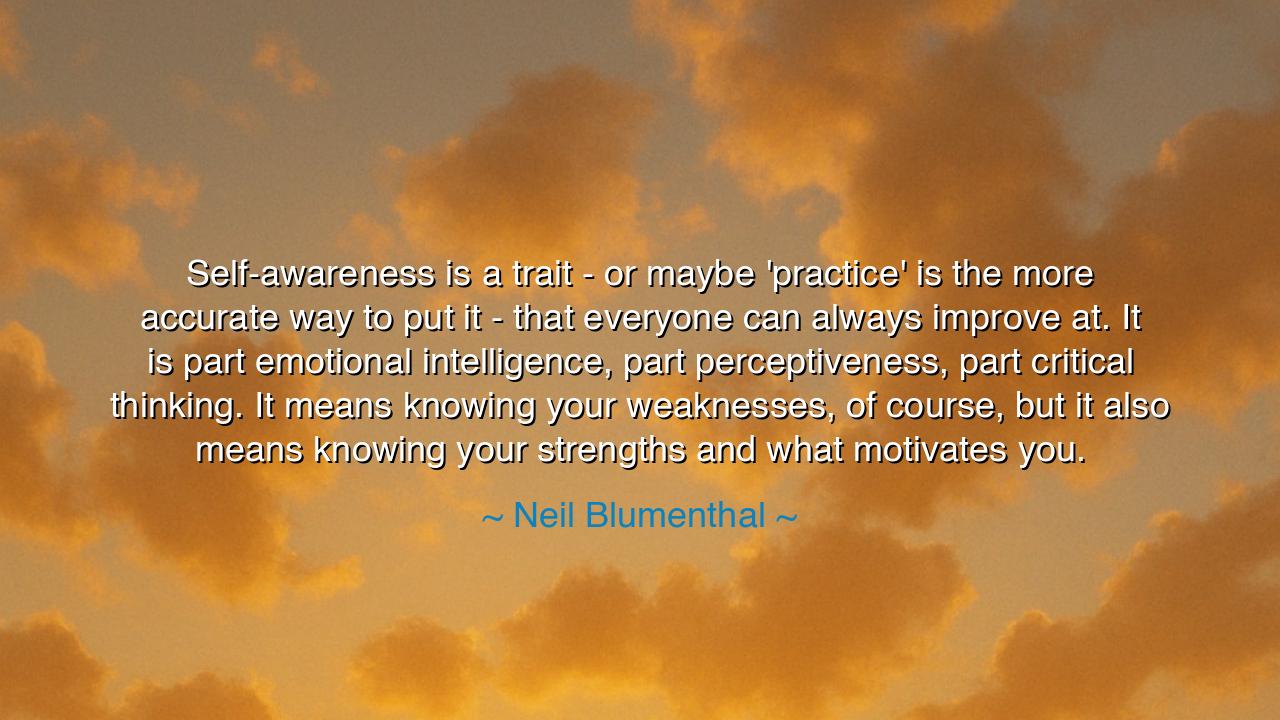
Self-awareness is a trait - or maybe 'practice' is the more
Self-awareness is a trait - or maybe 'practice' is the more accurate way to put it - that everyone can always improve at. It is part emotional intelligence, part perceptiveness, part critical thinking. It means knowing your weaknesses, of course, but it also means knowing your strengths and what motivates you.






"Self-awareness is a trait — or maybe 'practice' is the more accurate way to put it — that everyone can always improve at. It is part emotional intelligence, part perceptiveness, part critical thinking. It means knowing your weaknesses, of course, but it also means knowing your strengths and what motivates you." — Neil Blumenthal
Thus speaks Neil Blumenthal, the modern philosopher of enterprise and co-founder of Warby Parker, yet his wisdom echoes with the tone of the ancients. His words unveil the mirror of the soul — self-awareness, the light by which all other virtues are seen clearly. He teaches that this sacred quality is not a fixed trait, but a living practice, a lifelong art of seeing oneself truly. To know one’s inner nature — one’s strengths, one’s weaknesses, one’s motives and fears — is the beginning of mastery. For he who does not know himself is like a ship without a compass: swift in motion, but lost at sea.
In the ancient world, this teaching was carved upon the very stones of wisdom. Over the temple of Apollo at Delphi was inscribed the eternal command: “Know thyself.” The Greeks held this to be the foundation of all learning, for how can one rule cities, shape art, or seek truth if one is a stranger to the kingdom within? Yet Blumenthal’s insight renews this ancient command for our age. He calls self-awareness not a single revelation but a practice — something honed through reflection, humility, and effort. It is not achieved once and for all, but cultivated daily, as the farmer tends the field or the artist shapes the clay.
He describes self-awareness as a harmony of three great powers — emotional intelligence, perceptiveness, and critical thinking. Emotional intelligence gives one the ability to recognize the movement of feeling within, to understand anger before it burns, sorrow before it sinks, joy before it blinds. Perceptiveness is the art of seeing oneself as others see — the quiet power to observe one’s own behavior without pride or fear. Critical thinking, then, is the reason that tempers emotion, the intellect that questions not only the world but the self. Together, these form a trinity of self-knowledge — heart, vision, and mind united.
History itself bears witness to the strength of those who practiced this inner discipline. Consider Marcus Aurelius, the philosopher-king of Rome, who ruled the mightiest empire of his age yet spent each night in self-reflection. In his Meditations, he did not boast of victory, but examined his own soul: its impulses, its flaws, its duties. He ruled not only through legions and laws, but through mastery of self. His reign, though filled with trials, was marked by serenity — for the man who knows himself is not enslaved by circumstance. Thus, the emperor and Blumenthal speak the same truth: that power without self-awareness leads to ruin, but awareness without action leads to stillness; one must hold both in balance.
To know one’s weaknesses, as Blumenthal says, is to see the cracks in one’s armor and repair them before battle. But he adds something deeper — to know one’s strengths and motivations. This is the other half of wisdom often forgotten. For many spend their lives lamenting their flaws and never cultivating their gifts. True self-awareness is not self-criticism, but self-clarity — to recognize where one’s light shines brightest and to direct it with purpose. The wise man asks not only, “Where am I failing?” but also, “Where am I powerful, and how shall I use that power for good?”
Blumenthal’s teaching also speaks to the leaders and dreamers of this age — those who guide teams, build ideas, and shape communities. In his own life as an entrepreneur, he learned that success is not born from relentless ambition alone, but from reflection. The greatest leaders do not simply command; they listen, both to others and to themselves. They learn when to advance and when to pause, when to trust instinct and when to seek counsel. Self-awareness turns power into service, ambition into contribution. Without it, even brilliance becomes blind.
So take this as your lesson, seeker of truth: cultivate self-awareness as a daily practice. Set aside moments of stillness — at dawn, at dusk — to look within. Ask yourself not only what you have done, but why. Listen to the whispers of emotion without judgment, observe your thoughts as clouds that pass, and recognize both your strength and your weakness as teachers. Through this practice, you will not only understand yourself, but govern yourself — and that is the first step toward understanding and guiding the world. For as Blumenthal teaches, to know oneself is to hold the key to growth, purpose, and peace.






AAdministratorAdministrator
Welcome, honored guests. Please leave a comment, we will respond soon